South Korea's Business Culture & Practices
VerifiedAdded on 2020/03/04
|12
|2659
|34
AI Summary
This assignment delves into the unique aspects of South Korea's business culture, examining how cultural values shape organizational practices. It requires an analysis of Hofstede's cultural dimensions framework and its application to understanding South Korean businesses. Students are expected to explore topics such as individualism vs. collectivism, power distance, uncertainty avoidance, and long-term orientation, illustrating their impact on areas like communication, leadership styles, decision-making, and employee relations within the South Korean business context.
Contribute Materials
Your contribution can guide someone’s learning journey. Share your
documents today.
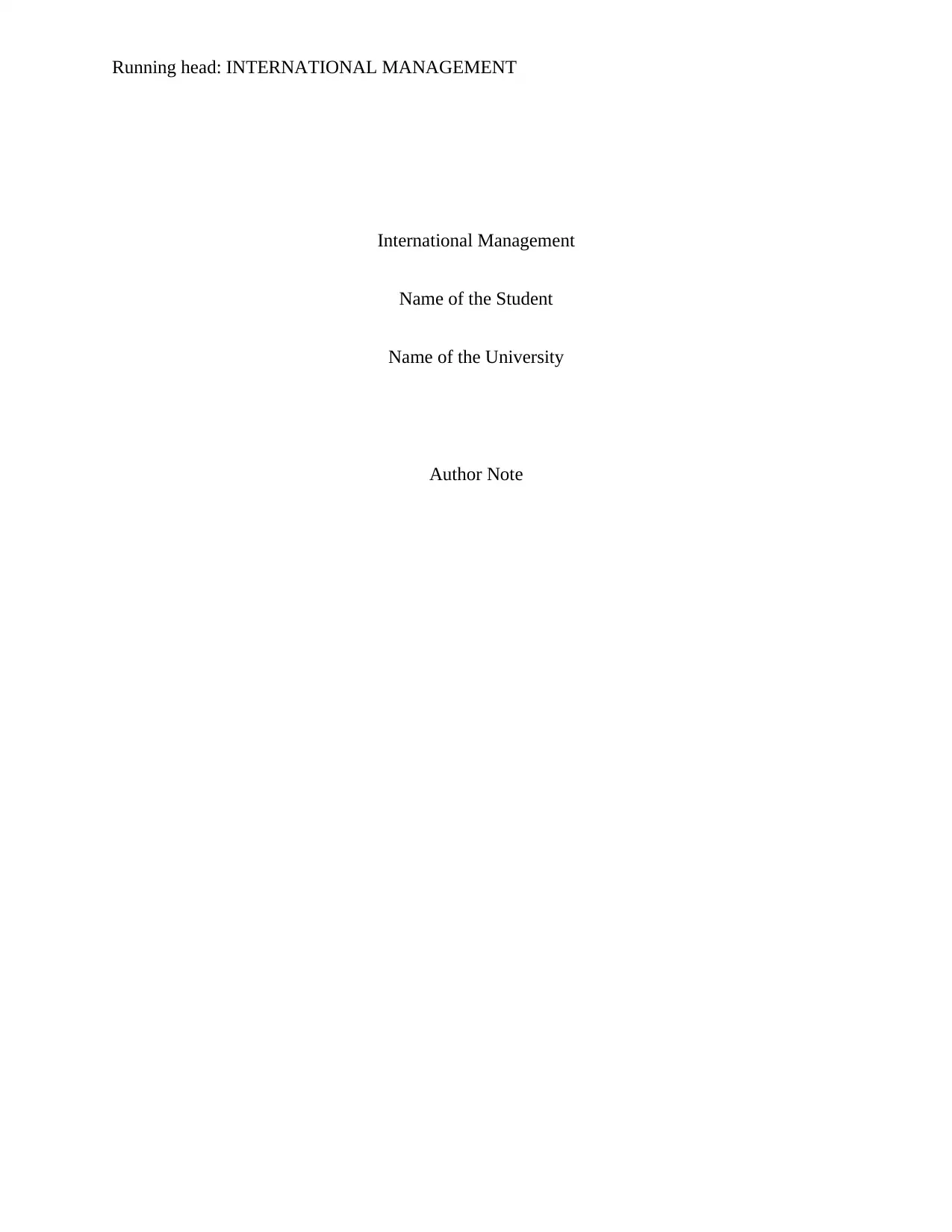
Running head: INTERNATIONAL MANAGEMENT
International Management
Name of the Student
Name of the University
Author Note
International Management
Name of the Student
Name of the University
Author Note
Secure Best Marks with AI Grader
Need help grading? Try our AI Grader for instant feedback on your assignments.
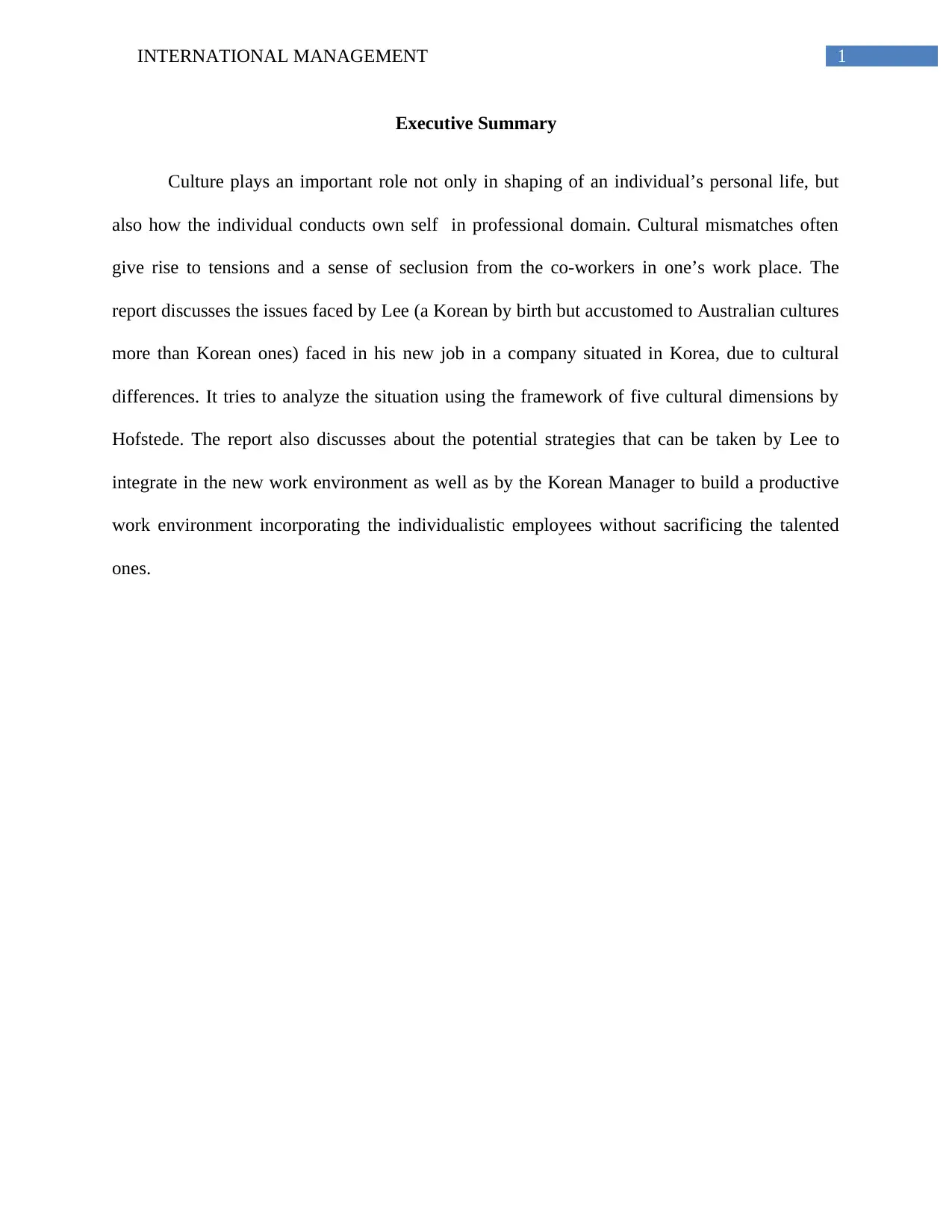
1INTERNATIONAL MANAGEMENT
Executive Summary
Culture plays an important role not only in shaping of an individual’s personal life, but
also how the individual conducts own self in professional domain. Cultural mismatches often
give rise to tensions and a sense of seclusion from the co-workers in one’s work place. The
report discusses the issues faced by Lee (a Korean by birth but accustomed to Australian cultures
more than Korean ones) faced in his new job in a company situated in Korea, due to cultural
differences. It tries to analyze the situation using the framework of five cultural dimensions by
Hofstede. The report also discusses about the potential strategies that can be taken by Lee to
integrate in the new work environment as well as by the Korean Manager to build a productive
work environment incorporating the individualistic employees without sacrificing the talented
ones.
Executive Summary
Culture plays an important role not only in shaping of an individual’s personal life, but
also how the individual conducts own self in professional domain. Cultural mismatches often
give rise to tensions and a sense of seclusion from the co-workers in one’s work place. The
report discusses the issues faced by Lee (a Korean by birth but accustomed to Australian cultures
more than Korean ones) faced in his new job in a company situated in Korea, due to cultural
differences. It tries to analyze the situation using the framework of five cultural dimensions by
Hofstede. The report also discusses about the potential strategies that can be taken by Lee to
integrate in the new work environment as well as by the Korean Manager to build a productive
work environment incorporating the individualistic employees without sacrificing the talented
ones.
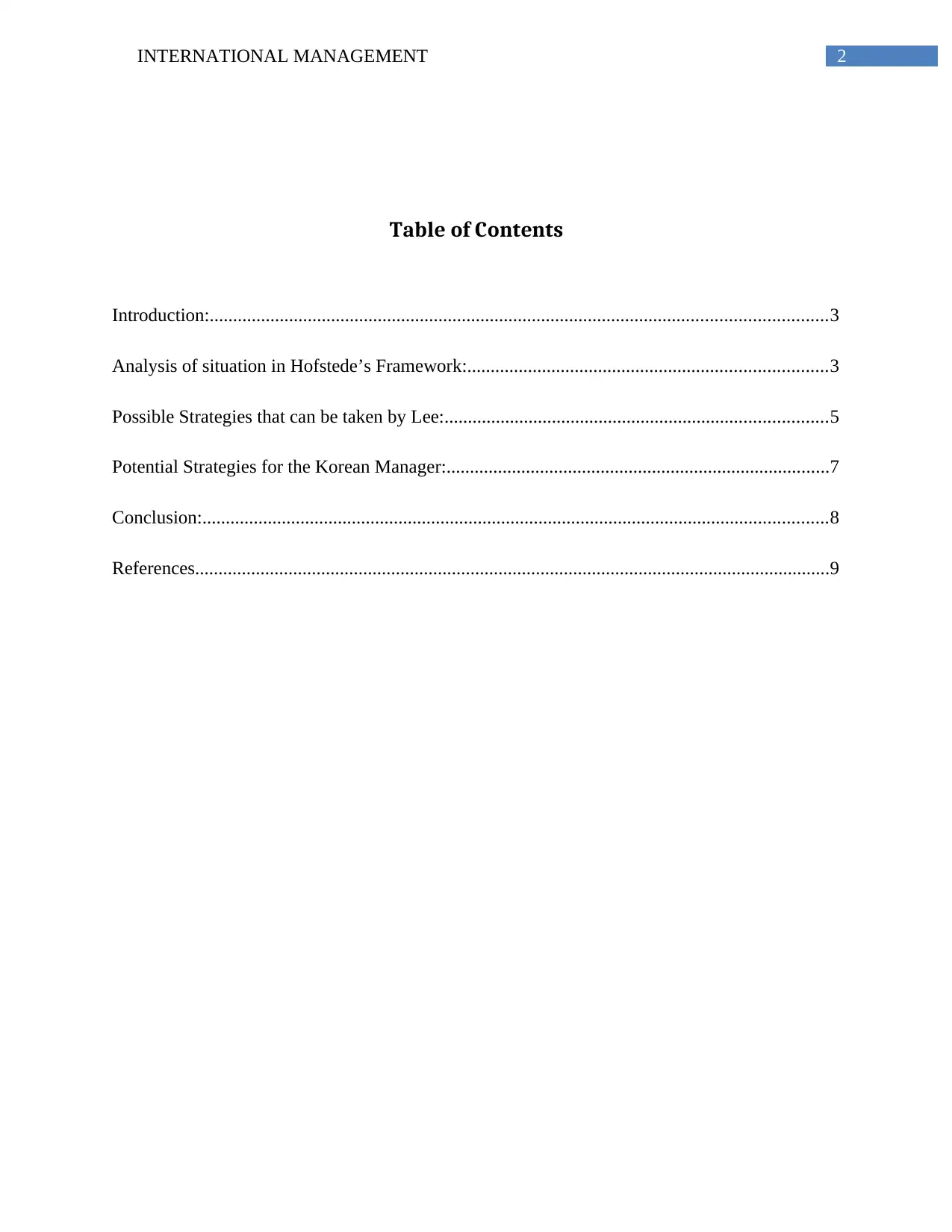
2INTERNATIONAL MANAGEMENT
Table of Contents
Introduction:....................................................................................................................................3
Analysis of situation in Hofstede’s Framework:.............................................................................3
Possible Strategies that can be taken by Lee:..................................................................................5
Potential Strategies for the Korean Manager:..................................................................................7
Conclusion:......................................................................................................................................8
References........................................................................................................................................9
Table of Contents
Introduction:....................................................................................................................................3
Analysis of situation in Hofstede’s Framework:.............................................................................3
Possible Strategies that can be taken by Lee:..................................................................................5
Potential Strategies for the Korean Manager:..................................................................................7
Conclusion:......................................................................................................................................8
References........................................................................................................................................9
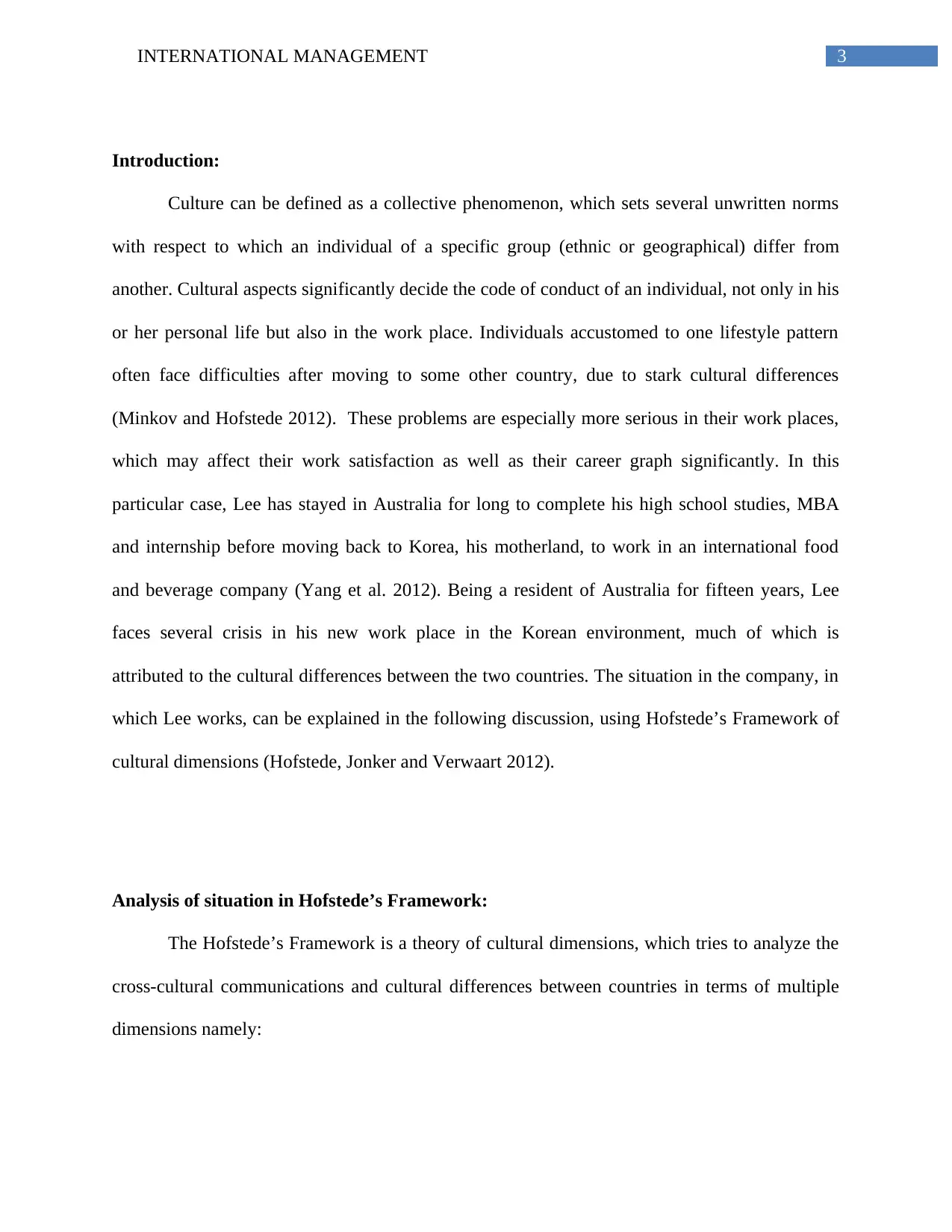
3INTERNATIONAL MANAGEMENT
Introduction:
Culture can be defined as a collective phenomenon, which sets several unwritten norms
with respect to which an individual of a specific group (ethnic or geographical) differ from
another. Cultural aspects significantly decide the code of conduct of an individual, not only in his
or her personal life but also in the work place. Individuals accustomed to one lifestyle pattern
often face difficulties after moving to some other country, due to stark cultural differences
(Minkov and Hofstede 2012). These problems are especially more serious in their work places,
which may affect their work satisfaction as well as their career graph significantly. In this
particular case, Lee has stayed in Australia for long to complete his high school studies, MBA
and internship before moving back to Korea, his motherland, to work in an international food
and beverage company (Yang et al. 2012). Being a resident of Australia for fifteen years, Lee
faces several crisis in his new work place in the Korean environment, much of which is
attributed to the cultural differences between the two countries. The situation in the company, in
which Lee works, can be explained in the following discussion, using Hofstede’s Framework of
cultural dimensions (Hofstede, Jonker and Verwaart 2012).
Analysis of situation in Hofstede’s Framework:
The Hofstede’s Framework is a theory of cultural dimensions, which tries to analyze the
cross-cultural communications and cultural differences between countries in terms of multiple
dimensions namely:
Introduction:
Culture can be defined as a collective phenomenon, which sets several unwritten norms
with respect to which an individual of a specific group (ethnic or geographical) differ from
another. Cultural aspects significantly decide the code of conduct of an individual, not only in his
or her personal life but also in the work place. Individuals accustomed to one lifestyle pattern
often face difficulties after moving to some other country, due to stark cultural differences
(Minkov and Hofstede 2012). These problems are especially more serious in their work places,
which may affect their work satisfaction as well as their career graph significantly. In this
particular case, Lee has stayed in Australia for long to complete his high school studies, MBA
and internship before moving back to Korea, his motherland, to work in an international food
and beverage company (Yang et al. 2012). Being a resident of Australia for fifteen years, Lee
faces several crisis in his new work place in the Korean environment, much of which is
attributed to the cultural differences between the two countries. The situation in the company, in
which Lee works, can be explained in the following discussion, using Hofstede’s Framework of
cultural dimensions (Hofstede, Jonker and Verwaart 2012).
Analysis of situation in Hofstede’s Framework:
The Hofstede’s Framework is a theory of cultural dimensions, which tries to analyze the
cross-cultural communications and cultural differences between countries in terms of multiple
dimensions namely:
Secure Best Marks with AI Grader
Need help grading? Try our AI Grader for instant feedback on your assignments.
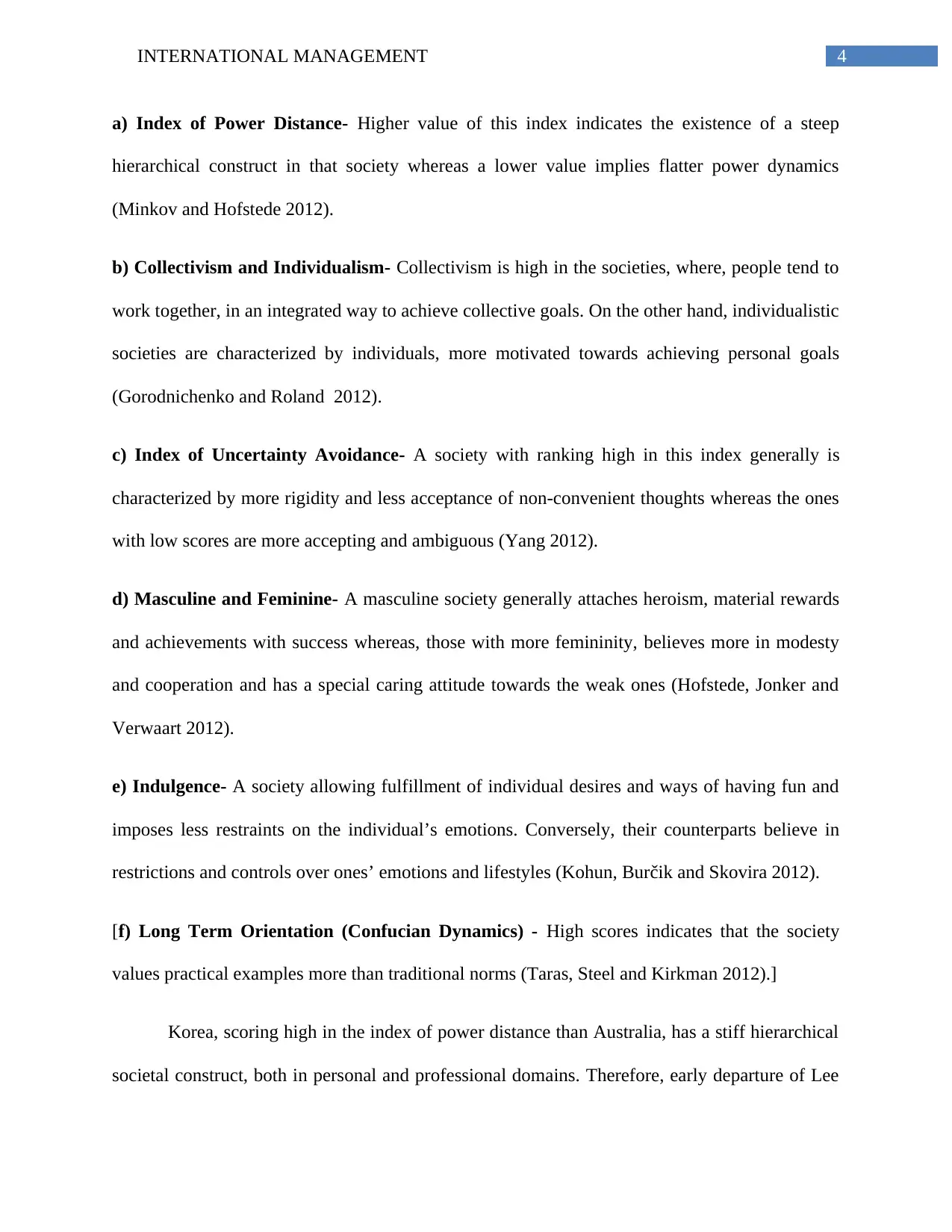
4INTERNATIONAL MANAGEMENT
a) Index of Power Distance- Higher value of this index indicates the existence of a steep
hierarchical construct in that society whereas a lower value implies flatter power dynamics
(Minkov and Hofstede 2012).
b) Collectivism and Individualism- Collectivism is high in the societies, where, people tend to
work together, in an integrated way to achieve collective goals. On the other hand, individualistic
societies are characterized by individuals, more motivated towards achieving personal goals
(Gorodnichenko and Roland 2012).
c) Index of Uncertainty Avoidance- A society with ranking high in this index generally is
characterized by more rigidity and less acceptance of non-convenient thoughts whereas the ones
with low scores are more accepting and ambiguous (Yang 2012).
d) Masculine and Feminine- A masculine society generally attaches heroism, material rewards
and achievements with success whereas, those with more femininity, believes more in modesty
and cooperation and has a special caring attitude towards the weak ones (Hofstede, Jonker and
Verwaart 2012).
e) Indulgence- A society allowing fulfillment of individual desires and ways of having fun and
imposes less restraints on the individual’s emotions. Conversely, their counterparts believe in
restrictions and controls over ones’ emotions and lifestyles (Kohun, Burčik and Skovira 2012).
[f) Long Term Orientation (Confucian Dynamics) - High scores indicates that the society
values practical examples more than traditional norms (Taras, Steel and Kirkman 2012).]
Korea, scoring high in the index of power distance than Australia, has a stiff hierarchical
societal construct, both in personal and professional domains. Therefore, early departure of Lee
a) Index of Power Distance- Higher value of this index indicates the existence of a steep
hierarchical construct in that society whereas a lower value implies flatter power dynamics
(Minkov and Hofstede 2012).
b) Collectivism and Individualism- Collectivism is high in the societies, where, people tend to
work together, in an integrated way to achieve collective goals. On the other hand, individualistic
societies are characterized by individuals, more motivated towards achieving personal goals
(Gorodnichenko and Roland 2012).
c) Index of Uncertainty Avoidance- A society with ranking high in this index generally is
characterized by more rigidity and less acceptance of non-convenient thoughts whereas the ones
with low scores are more accepting and ambiguous (Yang 2012).
d) Masculine and Feminine- A masculine society generally attaches heroism, material rewards
and achievements with success whereas, those with more femininity, believes more in modesty
and cooperation and has a special caring attitude towards the weak ones (Hofstede, Jonker and
Verwaart 2012).
e) Indulgence- A society allowing fulfillment of individual desires and ways of having fun and
imposes less restraints on the individual’s emotions. Conversely, their counterparts believe in
restrictions and controls over ones’ emotions and lifestyles (Kohun, Burčik and Skovira 2012).
[f) Long Term Orientation (Confucian Dynamics) - High scores indicates that the society
values practical examples more than traditional norms (Taras, Steel and Kirkman 2012).]
Korea, scoring high in the index of power distance than Australia, has a stiff hierarchical
societal construct, both in personal and professional domains. Therefore, early departure of Lee
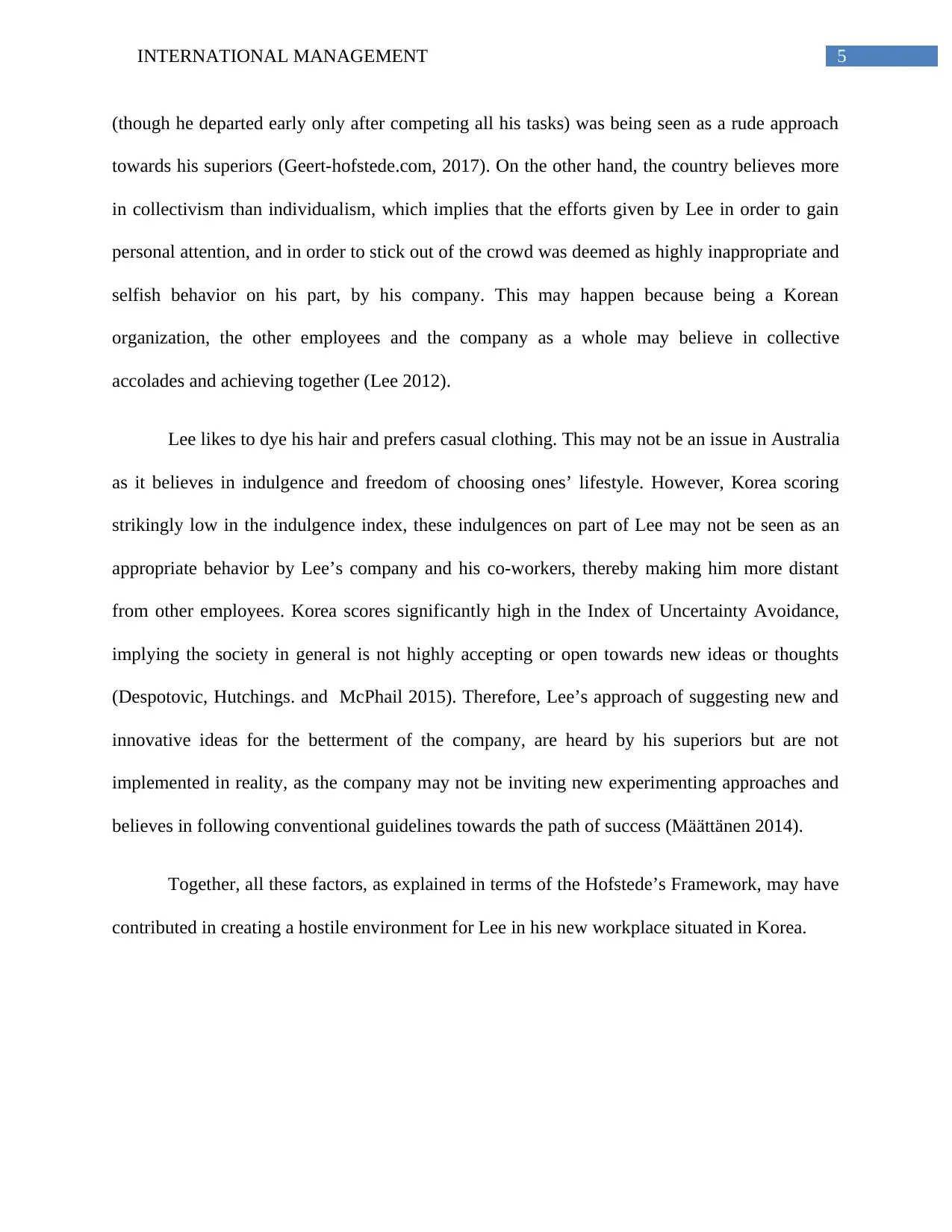
5INTERNATIONAL MANAGEMENT
(though he departed early only after competing all his tasks) was being seen as a rude approach
towards his superiors (Geert-hofstede.com, 2017). On the other hand, the country believes more
in collectivism than individualism, which implies that the efforts given by Lee in order to gain
personal attention, and in order to stick out of the crowd was deemed as highly inappropriate and
selfish behavior on his part, by his company. This may happen because being a Korean
organization, the other employees and the company as a whole may believe in collective
accolades and achieving together (Lee 2012).
Lee likes to dye his hair and prefers casual clothing. This may not be an issue in Australia
as it believes in indulgence and freedom of choosing ones’ lifestyle. However, Korea scoring
strikingly low in the indulgence index, these indulgences on part of Lee may not be seen as an
appropriate behavior by Lee’s company and his co-workers, thereby making him more distant
from other employees. Korea scores significantly high in the Index of Uncertainty Avoidance,
implying the society in general is not highly accepting or open towards new ideas or thoughts
(Despotovic, Hutchings. and McPhail 2015). Therefore, Lee’s approach of suggesting new and
innovative ideas for the betterment of the company, are heard by his superiors but are not
implemented in reality, as the company may not be inviting new experimenting approaches and
believes in following conventional guidelines towards the path of success (Määttänen 2014).
Together, all these factors, as explained in terms of the Hofstede’s Framework, may have
contributed in creating a hostile environment for Lee in his new workplace situated in Korea.
(though he departed early only after competing all his tasks) was being seen as a rude approach
towards his superiors (Geert-hofstede.com, 2017). On the other hand, the country believes more
in collectivism than individualism, which implies that the efforts given by Lee in order to gain
personal attention, and in order to stick out of the crowd was deemed as highly inappropriate and
selfish behavior on his part, by his company. This may happen because being a Korean
organization, the other employees and the company as a whole may believe in collective
accolades and achieving together (Lee 2012).
Lee likes to dye his hair and prefers casual clothing. This may not be an issue in Australia
as it believes in indulgence and freedom of choosing ones’ lifestyle. However, Korea scoring
strikingly low in the indulgence index, these indulgences on part of Lee may not be seen as an
appropriate behavior by Lee’s company and his co-workers, thereby making him more distant
from other employees. Korea scores significantly high in the Index of Uncertainty Avoidance,
implying the society in general is not highly accepting or open towards new ideas or thoughts
(Despotovic, Hutchings. and McPhail 2015). Therefore, Lee’s approach of suggesting new and
innovative ideas for the betterment of the company, are heard by his superiors but are not
implemented in reality, as the company may not be inviting new experimenting approaches and
believes in following conventional guidelines towards the path of success (Määttänen 2014).
Together, all these factors, as explained in terms of the Hofstede’s Framework, may have
contributed in creating a hostile environment for Lee in his new workplace situated in Korea.
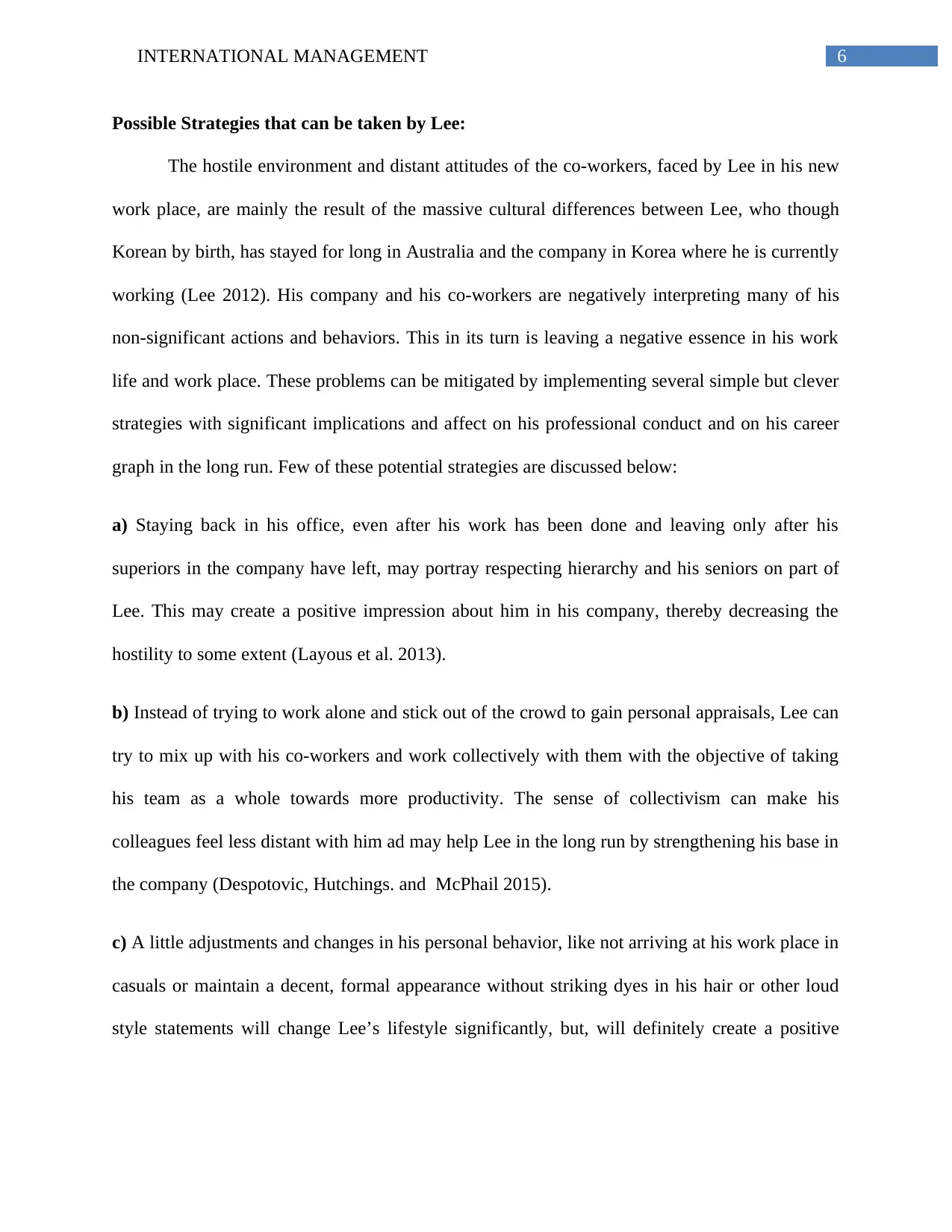
6INTERNATIONAL MANAGEMENT
Possible Strategies that can be taken by Lee:
The hostile environment and distant attitudes of the co-workers, faced by Lee in his new
work place, are mainly the result of the massive cultural differences between Lee, who though
Korean by birth, has stayed for long in Australia and the company in Korea where he is currently
working (Lee 2012). His company and his co-workers are negatively interpreting many of his
non-significant actions and behaviors. This in its turn is leaving a negative essence in his work
life and work place. These problems can be mitigated by implementing several simple but clever
strategies with significant implications and affect on his professional conduct and on his career
graph in the long run. Few of these potential strategies are discussed below:
a) Staying back in his office, even after his work has been done and leaving only after his
superiors in the company have left, may portray respecting hierarchy and his seniors on part of
Lee. This may create a positive impression about him in his company, thereby decreasing the
hostility to some extent (Layous et al. 2013).
b) Instead of trying to work alone and stick out of the crowd to gain personal appraisals, Lee can
try to mix up with his co-workers and work collectively with them with the objective of taking
his team as a whole towards more productivity. The sense of collectivism can make his
colleagues feel less distant with him ad may help Lee in the long run by strengthening his base in
the company (Despotovic, Hutchings. and McPhail 2015).
c) A little adjustments and changes in his personal behavior, like not arriving at his work place in
casuals or maintain a decent, formal appearance without striking dyes in his hair or other loud
style statements will change Lee’s lifestyle significantly, but, will definitely create a positive
Possible Strategies that can be taken by Lee:
The hostile environment and distant attitudes of the co-workers, faced by Lee in his new
work place, are mainly the result of the massive cultural differences between Lee, who though
Korean by birth, has stayed for long in Australia and the company in Korea where he is currently
working (Lee 2012). His company and his co-workers are negatively interpreting many of his
non-significant actions and behaviors. This in its turn is leaving a negative essence in his work
life and work place. These problems can be mitigated by implementing several simple but clever
strategies with significant implications and affect on his professional conduct and on his career
graph in the long run. Few of these potential strategies are discussed below:
a) Staying back in his office, even after his work has been done and leaving only after his
superiors in the company have left, may portray respecting hierarchy and his seniors on part of
Lee. This may create a positive impression about him in his company, thereby decreasing the
hostility to some extent (Layous et al. 2013).
b) Instead of trying to work alone and stick out of the crowd to gain personal appraisals, Lee can
try to mix up with his co-workers and work collectively with them with the objective of taking
his team as a whole towards more productivity. The sense of collectivism can make his
colleagues feel less distant with him ad may help Lee in the long run by strengthening his base in
the company (Despotovic, Hutchings. and McPhail 2015).
c) A little adjustments and changes in his personal behavior, like not arriving at his work place in
casuals or maintain a decent, formal appearance without striking dyes in his hair or other loud
style statements will change Lee’s lifestyle significantly, but, will definitely create a positive
Paraphrase This Document
Need a fresh take? Get an instant paraphrase of this document with our AI Paraphraser
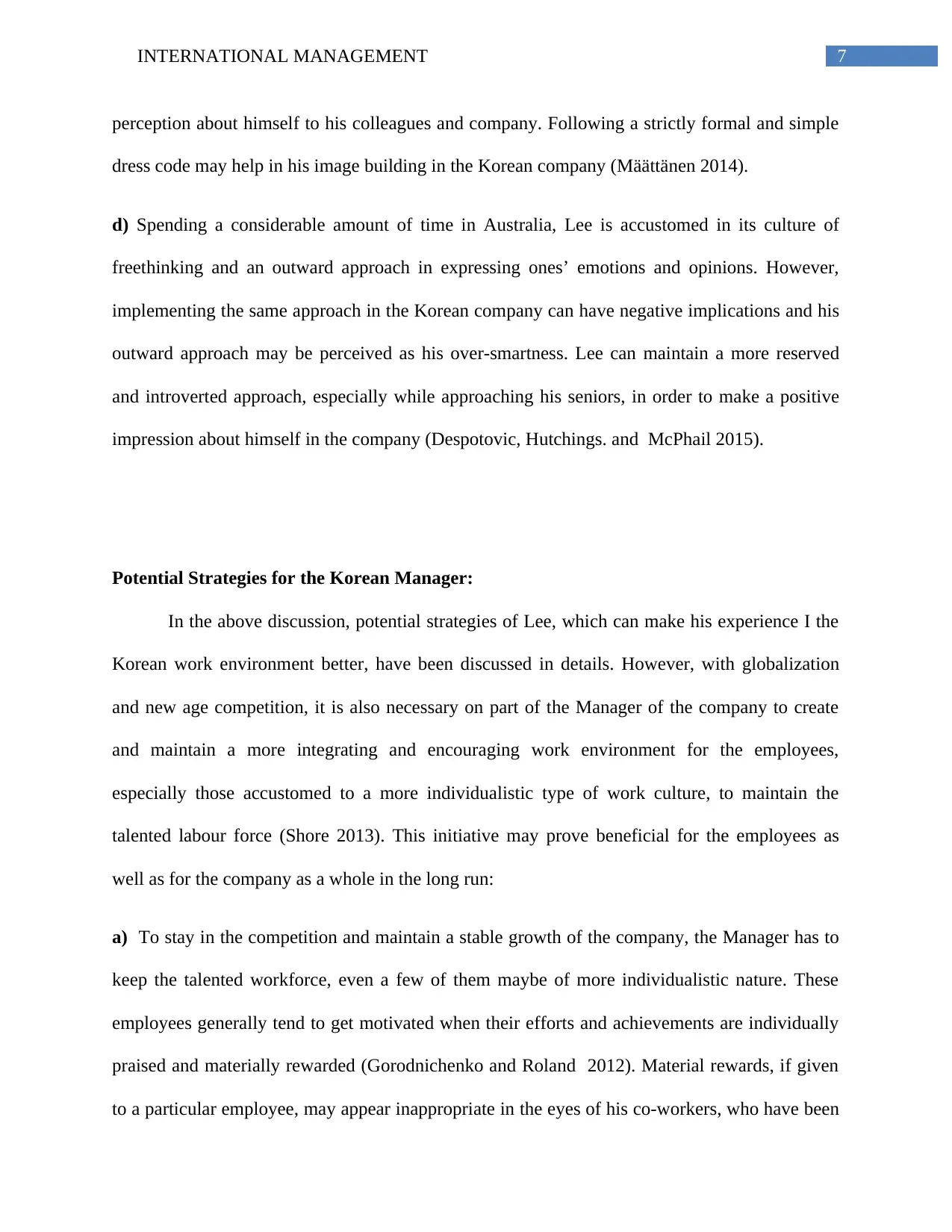
7INTERNATIONAL MANAGEMENT
perception about himself to his colleagues and company. Following a strictly formal and simple
dress code may help in his image building in the Korean company (Määttänen 2014).
d) Spending a considerable amount of time in Australia, Lee is accustomed in its culture of
freethinking and an outward approach in expressing ones’ emotions and opinions. However,
implementing the same approach in the Korean company can have negative implications and his
outward approach may be perceived as his over-smartness. Lee can maintain a more reserved
and introverted approach, especially while approaching his seniors, in order to make a positive
impression about himself in the company (Despotovic, Hutchings. and McPhail 2015).
Potential Strategies for the Korean Manager:
In the above discussion, potential strategies of Lee, which can make his experience I the
Korean work environment better, have been discussed in details. However, with globalization
and new age competition, it is also necessary on part of the Manager of the company to create
and maintain a more integrating and encouraging work environment for the employees,
especially those accustomed to a more individualistic type of work culture, to maintain the
talented labour force (Shore 2013). This initiative may prove beneficial for the employees as
well as for the company as a whole in the long run:
a) To stay in the competition and maintain a stable growth of the company, the Manager has to
keep the talented workforce, even a few of them maybe of more individualistic nature. These
employees generally tend to get motivated when their efforts and achievements are individually
praised and materially rewarded (Gorodnichenko and Roland 2012). Material rewards, if given
to a particular employee, may appear inappropriate in the eyes of his co-workers, who have been
perception about himself to his colleagues and company. Following a strictly formal and simple
dress code may help in his image building in the Korean company (Määttänen 2014).
d) Spending a considerable amount of time in Australia, Lee is accustomed in its culture of
freethinking and an outward approach in expressing ones’ emotions and opinions. However,
implementing the same approach in the Korean company can have negative implications and his
outward approach may be perceived as his over-smartness. Lee can maintain a more reserved
and introverted approach, especially while approaching his seniors, in order to make a positive
impression about himself in the company (Despotovic, Hutchings. and McPhail 2015).
Potential Strategies for the Korean Manager:
In the above discussion, potential strategies of Lee, which can make his experience I the
Korean work environment better, have been discussed in details. However, with globalization
and new age competition, it is also necessary on part of the Manager of the company to create
and maintain a more integrating and encouraging work environment for the employees,
especially those accustomed to a more individualistic type of work culture, to maintain the
talented labour force (Shore 2013). This initiative may prove beneficial for the employees as
well as for the company as a whole in the long run:
a) To stay in the competition and maintain a stable growth of the company, the Manager has to
keep the talented workforce, even a few of them maybe of more individualistic nature. These
employees generally tend to get motivated when their efforts and achievements are individually
praised and materially rewarded (Gorodnichenko and Roland 2012). Material rewards, if given
to a particular employee, may appear inappropriate in the eyes of his co-workers, who have been
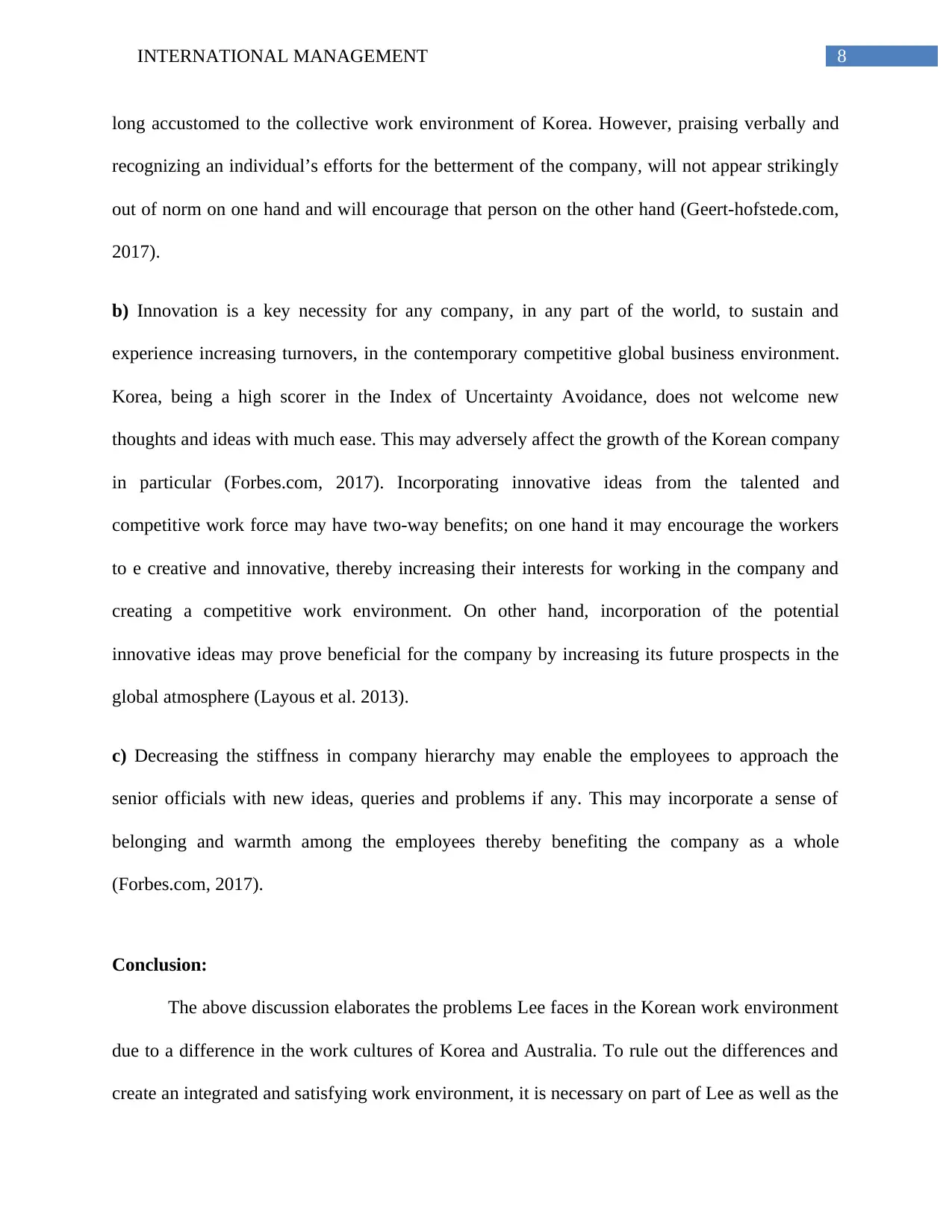
8INTERNATIONAL MANAGEMENT
long accustomed to the collective work environment of Korea. However, praising verbally and
recognizing an individual’s efforts for the betterment of the company, will not appear strikingly
out of norm on one hand and will encourage that person on the other hand (Geert-hofstede.com,
2017).
b) Innovation is a key necessity for any company, in any part of the world, to sustain and
experience increasing turnovers, in the contemporary competitive global business environment.
Korea, being a high scorer in the Index of Uncertainty Avoidance, does not welcome new
thoughts and ideas with much ease. This may adversely affect the growth of the Korean company
in particular (Forbes.com, 2017). Incorporating innovative ideas from the talented and
competitive work force may have two-way benefits; on one hand it may encourage the workers
to e creative and innovative, thereby increasing their interests for working in the company and
creating a competitive work environment. On other hand, incorporation of the potential
innovative ideas may prove beneficial for the company by increasing its future prospects in the
global atmosphere (Layous et al. 2013).
c) Decreasing the stiffness in company hierarchy may enable the employees to approach the
senior officials with new ideas, queries and problems if any. This may incorporate a sense of
belonging and warmth among the employees thereby benefiting the company as a whole
(Forbes.com, 2017).
Conclusion:
The above discussion elaborates the problems Lee faces in the Korean work environment
due to a difference in the work cultures of Korea and Australia. To rule out the differences and
create an integrated and satisfying work environment, it is necessary on part of Lee as well as the
long accustomed to the collective work environment of Korea. However, praising verbally and
recognizing an individual’s efforts for the betterment of the company, will not appear strikingly
out of norm on one hand and will encourage that person on the other hand (Geert-hofstede.com,
2017).
b) Innovation is a key necessity for any company, in any part of the world, to sustain and
experience increasing turnovers, in the contemporary competitive global business environment.
Korea, being a high scorer in the Index of Uncertainty Avoidance, does not welcome new
thoughts and ideas with much ease. This may adversely affect the growth of the Korean company
in particular (Forbes.com, 2017). Incorporating innovative ideas from the talented and
competitive work force may have two-way benefits; on one hand it may encourage the workers
to e creative and innovative, thereby increasing their interests for working in the company and
creating a competitive work environment. On other hand, incorporation of the potential
innovative ideas may prove beneficial for the company by increasing its future prospects in the
global atmosphere (Layous et al. 2013).
c) Decreasing the stiffness in company hierarchy may enable the employees to approach the
senior officials with new ideas, queries and problems if any. This may incorporate a sense of
belonging and warmth among the employees thereby benefiting the company as a whole
(Forbes.com, 2017).
Conclusion:
The above discussion elaborates the problems Lee faces in the Korean work environment
due to a difference in the work cultures of Korea and Australia. To rule out the differences and
create an integrated and satisfying work environment, it is necessary on part of Lee as well as the
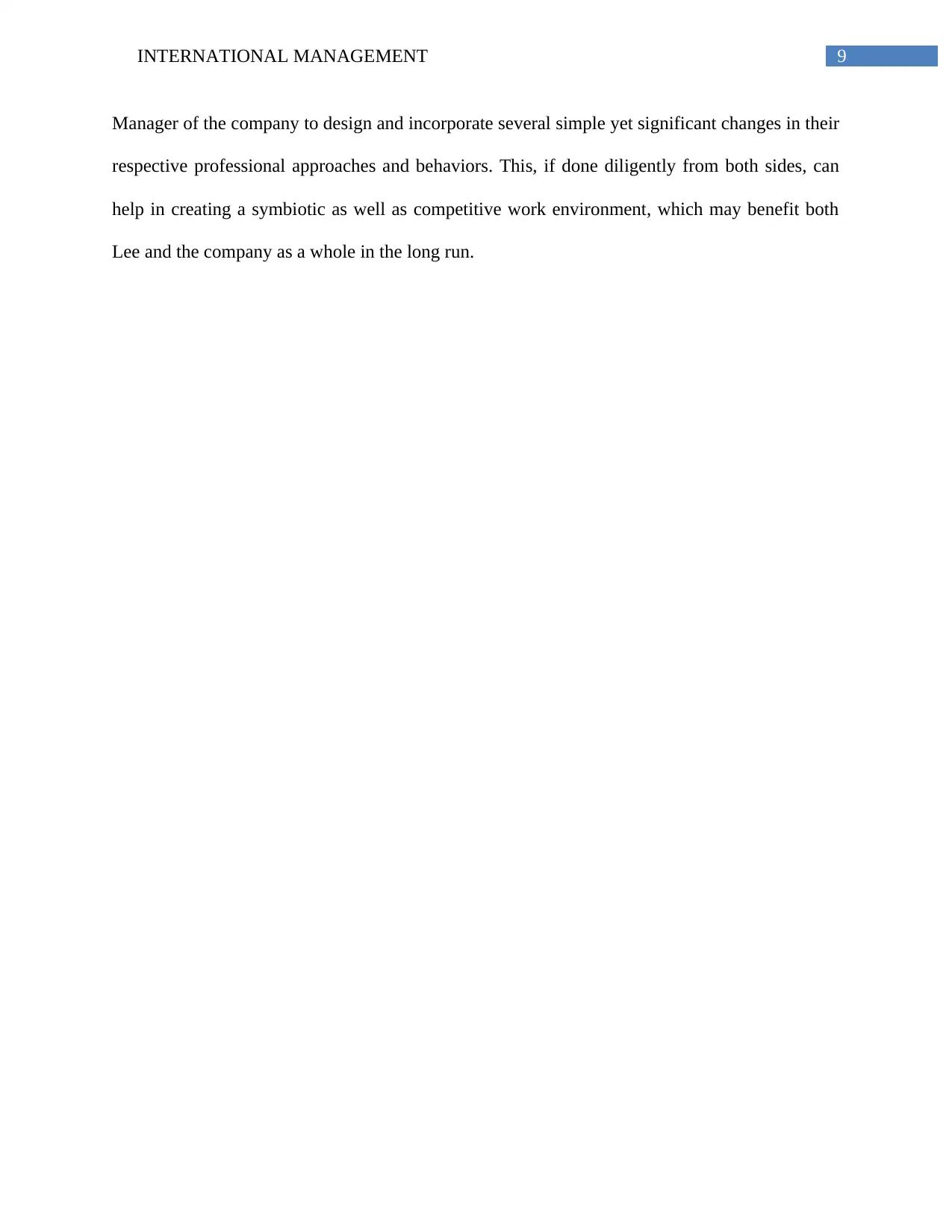
9INTERNATIONAL MANAGEMENT
Manager of the company to design and incorporate several simple yet significant changes in their
respective professional approaches and behaviors. This, if done diligently from both sides, can
help in creating a symbiotic as well as competitive work environment, which may benefit both
Lee and the company as a whole in the long run.
Manager of the company to design and incorporate several simple yet significant changes in their
respective professional approaches and behaviors. This, if done diligently from both sides, can
help in creating a symbiotic as well as competitive work environment, which may benefit both
Lee and the company as a whole in the long run.
Secure Best Marks with AI Grader
Need help grading? Try our AI Grader for instant feedback on your assignments.
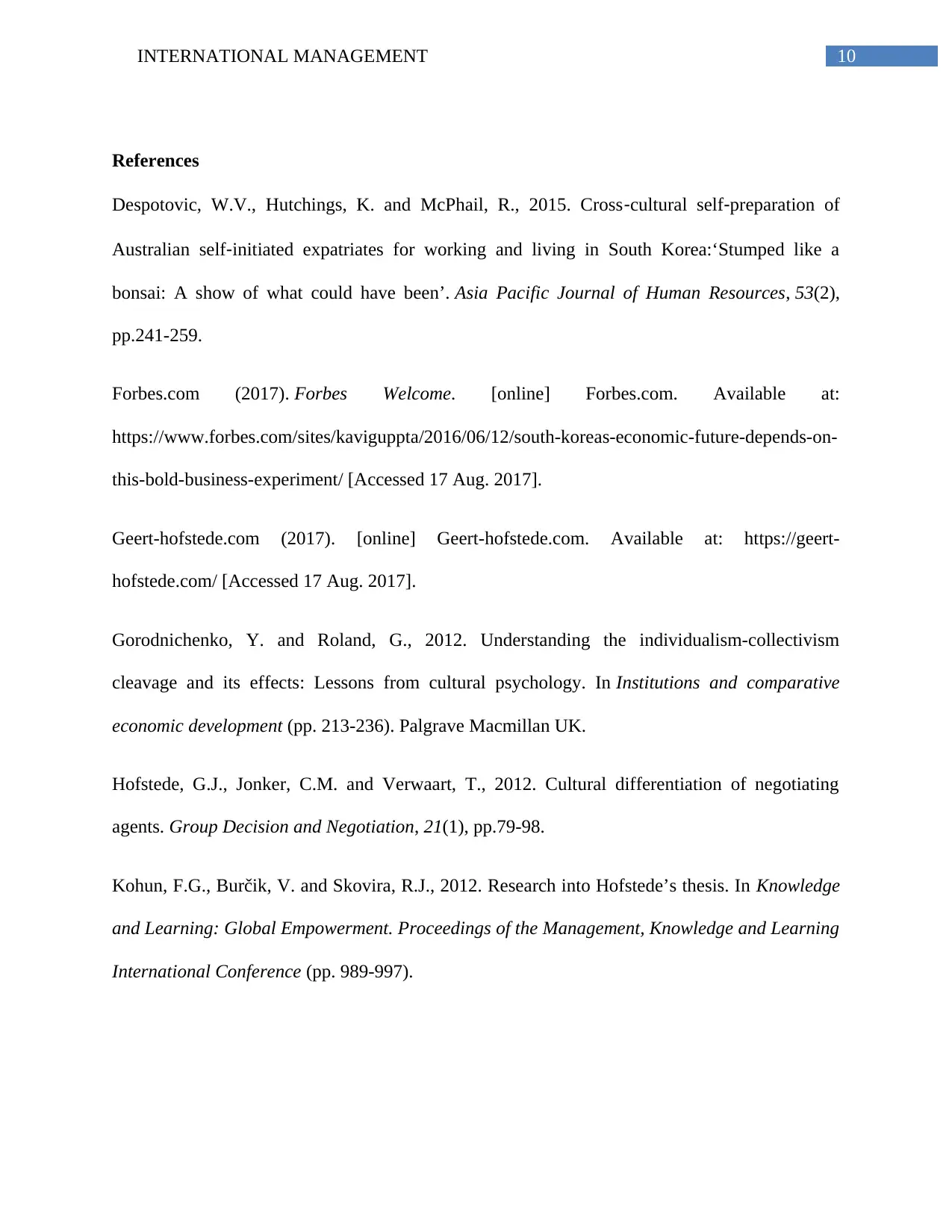
10INTERNATIONAL MANAGEMENT
References
Despotovic, W.V., Hutchings, K. and McPhail, R., 2015. Cross‐cultural self‐preparation of
Australian self‐initiated expatriates for working and living in South Korea:‘Stumped like a
bonsai: A show of what could have been’. Asia Pacific Journal of Human Resources, 53(2),
pp.241-259.
Forbes.com (2017). Forbes Welcome. [online] Forbes.com. Available at:
https://www.forbes.com/sites/kaviguppta/2016/06/12/south-koreas-economic-future-depends-on-
this-bold-business-experiment/ [Accessed 17 Aug. 2017].
Geert-hofstede.com (2017). [online] Geert-hofstede.com. Available at: https://geert-
hofstede.com/ [Accessed 17 Aug. 2017].
Gorodnichenko, Y. and Roland, G., 2012. Understanding the individualism-collectivism
cleavage and its effects: Lessons from cultural psychology. In Institutions and comparative
economic development (pp. 213-236). Palgrave Macmillan UK.
Hofstede, G.J., Jonker, C.M. and Verwaart, T., 2012. Cultural differentiation of negotiating
agents. Group Decision and Negotiation, 21(1), pp.79-98.
Kohun, F.G., Burčik, V. and Skovira, R.J., 2012. Research into Hofstede’s thesis. In Knowledge
and Learning: Global Empowerment. Proceedings of the Management, Knowledge and Learning
International Conference (pp. 989-997).
References
Despotovic, W.V., Hutchings, K. and McPhail, R., 2015. Cross‐cultural self‐preparation of
Australian self‐initiated expatriates for working and living in South Korea:‘Stumped like a
bonsai: A show of what could have been’. Asia Pacific Journal of Human Resources, 53(2),
pp.241-259.
Forbes.com (2017). Forbes Welcome. [online] Forbes.com. Available at:
https://www.forbes.com/sites/kaviguppta/2016/06/12/south-koreas-economic-future-depends-on-
this-bold-business-experiment/ [Accessed 17 Aug. 2017].
Geert-hofstede.com (2017). [online] Geert-hofstede.com. Available at: https://geert-
hofstede.com/ [Accessed 17 Aug. 2017].
Gorodnichenko, Y. and Roland, G., 2012. Understanding the individualism-collectivism
cleavage and its effects: Lessons from cultural psychology. In Institutions and comparative
economic development (pp. 213-236). Palgrave Macmillan UK.
Hofstede, G.J., Jonker, C.M. and Verwaart, T., 2012. Cultural differentiation of negotiating
agents. Group Decision and Negotiation, 21(1), pp.79-98.
Kohun, F.G., Burčik, V. and Skovira, R.J., 2012. Research into Hofstede’s thesis. In Knowledge
and Learning: Global Empowerment. Proceedings of the Management, Knowledge and Learning
International Conference (pp. 989-997).
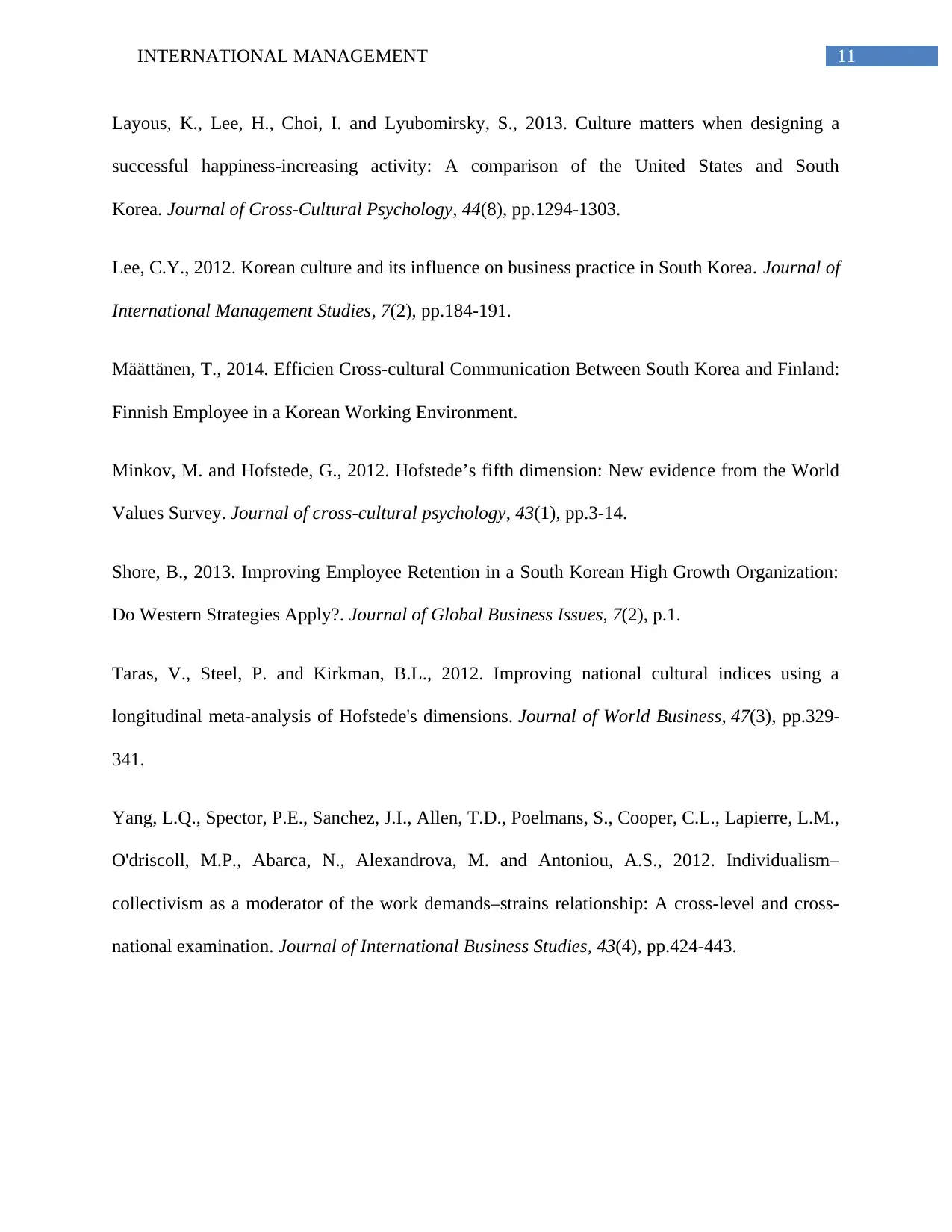
11INTERNATIONAL MANAGEMENT
Layous, K., Lee, H., Choi, I. and Lyubomirsky, S., 2013. Culture matters when designing a
successful happiness-increasing activity: A comparison of the United States and South
Korea. Journal of Cross-Cultural Psychology, 44(8), pp.1294-1303.
Lee, C.Y., 2012. Korean culture and its influence on business practice in South Korea. Journal of
International Management Studies, 7(2), pp.184-191.
Määttänen, T., 2014. Efficien Cross-cultural Communication Between South Korea and Finland:
Finnish Employee in a Korean Working Environment.
Minkov, M. and Hofstede, G., 2012. Hofstede’s fifth dimension: New evidence from the World
Values Survey. Journal of cross-cultural psychology, 43(1), pp.3-14.
Shore, B., 2013. Improving Employee Retention in a South Korean High Growth Organization:
Do Western Strategies Apply?. Journal of Global Business Issues, 7(2), p.1.
Taras, V., Steel, P. and Kirkman, B.L., 2012. Improving national cultural indices using a
longitudinal meta-analysis of Hofstede's dimensions. Journal of World Business, 47(3), pp.329-
341.
Yang, L.Q., Spector, P.E., Sanchez, J.I., Allen, T.D., Poelmans, S., Cooper, C.L., Lapierre, L.M.,
O'driscoll, M.P., Abarca, N., Alexandrova, M. and Antoniou, A.S., 2012. Individualism–
collectivism as a moderator of the work demands–strains relationship: A cross-level and cross-
national examination. Journal of International Business Studies, 43(4), pp.424-443.
Layous, K., Lee, H., Choi, I. and Lyubomirsky, S., 2013. Culture matters when designing a
successful happiness-increasing activity: A comparison of the United States and South
Korea. Journal of Cross-Cultural Psychology, 44(8), pp.1294-1303.
Lee, C.Y., 2012. Korean culture and its influence on business practice in South Korea. Journal of
International Management Studies, 7(2), pp.184-191.
Määttänen, T., 2014. Efficien Cross-cultural Communication Between South Korea and Finland:
Finnish Employee in a Korean Working Environment.
Minkov, M. and Hofstede, G., 2012. Hofstede’s fifth dimension: New evidence from the World
Values Survey. Journal of cross-cultural psychology, 43(1), pp.3-14.
Shore, B., 2013. Improving Employee Retention in a South Korean High Growth Organization:
Do Western Strategies Apply?. Journal of Global Business Issues, 7(2), p.1.
Taras, V., Steel, P. and Kirkman, B.L., 2012. Improving national cultural indices using a
longitudinal meta-analysis of Hofstede's dimensions. Journal of World Business, 47(3), pp.329-
341.
Yang, L.Q., Spector, P.E., Sanchez, J.I., Allen, T.D., Poelmans, S., Cooper, C.L., Lapierre, L.M.,
O'driscoll, M.P., Abarca, N., Alexandrova, M. and Antoniou, A.S., 2012. Individualism–
collectivism as a moderator of the work demands–strains relationship: A cross-level and cross-
national examination. Journal of International Business Studies, 43(4), pp.424-443.
1 out of 12
Related Documents
Your All-in-One AI-Powered Toolkit for Academic Success.
+13062052269
info@desklib.com
Available 24*7 on WhatsApp / Email
![[object Object]](/_next/static/media/star-bottom.7253800d.svg)
Unlock your academic potential
© 2024 | Zucol Services PVT LTD | All rights reserved.





